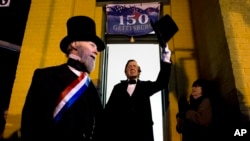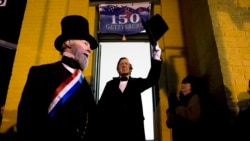One hundred fifty years ago this week, Abraham Lincoln delivered what’s generally regarded as the greatest speech ever given by an American president. The nation was mired in a ruinous civil war, and though five months earlier government forces had beaten back a Confederate invasion with a pivotal victory in the small Pennsylvania town of Gettysburg, Lincoln felt he needed to urge his doubtful countrymen to stay the course. In addressing a crowd gathered to dedicate a military cemetery near the battlefield, he did just that. He also redefined American nationhood and inspired millions both here and abroad on the sacrifices needed to preserve liberty.
In a day when long-winded speeches were the norm, Lincoln’s remarks were brief, and less anyone miss their meaning, very much to the point. Just 272 words, and reputedly drafted on the back of an envelope during the train trip north from Washington.
His famous opening line -- “Four score and seven years ago, our fathers brought forth on this continent, a new nation, conceived in liberty and dedicated to the proposition that all men are created equal.” – reminded his audience what was as stake in the struggle. The date refers to the signing of the American Declaration of Independence in 1776, and connected the sacrifices of those who had fought and died at Gettysburg with the work of the nation’s Founding Fathers.
The word “nation” is key, and he used it several times. At the war’s end, Lincoln called for reconciliation of the North and South, but on different terms than those that existed before the fighting. He called for a strong, but responsive national state; a government “of the people, by the people, for the people.” Such a nation would preserve liberty with a common, not sectional purpose.
Fusing liberty with nationalism in this way, Lincoln inspired his countrymen to see the war through to achieve this vision. A powerful central government was to emerge, one charged with honoring the Founding Father’s ideals about liberty for the individual, while strong enough to preserve the rights and privileges of all. In his brief remarks, Lincoln was to forever change how Americans think about their country.
In a day when long-winded speeches were the norm, Lincoln’s remarks were brief, and less anyone miss their meaning, very much to the point. Just 272 words, and reputedly drafted on the back of an envelope during the train trip north from Washington.
His famous opening line -- “Four score and seven years ago, our fathers brought forth on this continent, a new nation, conceived in liberty and dedicated to the proposition that all men are created equal.” – reminded his audience what was as stake in the struggle. The date refers to the signing of the American Declaration of Independence in 1776, and connected the sacrifices of those who had fought and died at Gettysburg with the work of the nation’s Founding Fathers.
The word “nation” is key, and he used it several times. At the war’s end, Lincoln called for reconciliation of the North and South, but on different terms than those that existed before the fighting. He called for a strong, but responsive national state; a government “of the people, by the people, for the people.” Such a nation would preserve liberty with a common, not sectional purpose.
Fusing liberty with nationalism in this way, Lincoln inspired his countrymen to see the war through to achieve this vision. A powerful central government was to emerge, one charged with honoring the Founding Father’s ideals about liberty for the individual, while strong enough to preserve the rights and privileges of all. In his brief remarks, Lincoln was to forever change how Americans think about their country.















